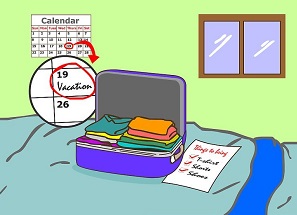Why is my OCD Worse On Vacation?
Why is my OCD Worse On Vacation?

Many of my patients took an extended holiday over the Christmas/New Year's break. When they returned to treatment in midJanuary most of them reported that their OCD symptoms had worsened. Obsessions returned that had been dormant. New obsessions and compulsions emerged and sometimes they didn’t realize this was OCD because the content of the OCD was unfamiliar. Compulsions they had been successful resisting in the past were much harder to resist. If you have OCD, it’s helpful to understand what may happen when you go on vacation.
Vacations typically involve a change in routine. Sleeping later in the morning, not getting enough sleep, or shifting your sleep schedule to accommodate a time change can exacerbate OCD. You aren’t working and therefore your brain is more idle. You may be eating different foods and drinking more alcohol. You may be visiting relatives and staying in your family’s home after having been away for an extended period. When returning to the family home, after having lived independently, the familiarity of the environment can trigger old obsessions and compulsions.
One of the most common complaints from my patients was boredom. They just didn’t have enough to do. When someone with OCD has too little stimulation in their lives, OCD typically spikes. OCD also spikes when there is too much stress. I tell my patients to aim for an optimal level of stress and stimulation in their lives not too much or too little. Vacations can disrupt that balance. However, it’s actually important to be triggered, especially when you least expect it. (You may be on vacation, but your OCD isn’t!) Even if you felt that your OCD got the better of you while you were away, and you’re angry that you weren’t able to enjoy yourself as much as you hoped, you will understand how OCD can masquerade in different ways and you will be better off knowing that. Once you’re back from vacation and have resumed your normal routine for a week or so, your OCD will typically calm down. The gains you made in treatment, before the vacation, are still there.












